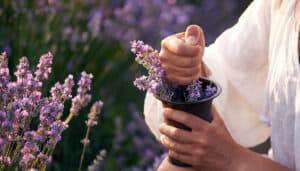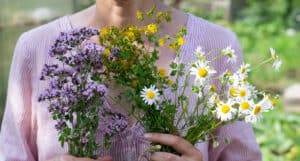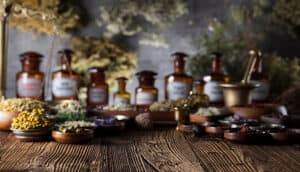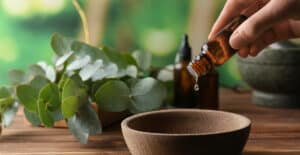Depression is a complicated topic. It can take many forms and manifest differently for each individual. Depression also arises for different reasons and will require treatment and support based on the cause. Sometimes, the cause is unknown, which can cause incredible frustration and loss of hope for the individual as to how to navigate it.
When considering medicinal herbs for depression, it’s essential to take a holistic approach, which encompasses every area of a person’s life. This approach challenges the concept of “herbs for depression” or even controversially, “take this pill for this problem.”
I’m challenging those phrases because depression, like any psychological or physiological disease, is multi-dimensional. It affects and influences every area of one’s life, including lifestyle, diet, social constructs, exercise, and spiritual life. To approach depression holistically, every area of life must be evaluated and improved, if necessary.
Because of this, the Herbal Supports for Healing Depression guide will briefly address the different forms of depression, lifestyle influences, and how herbs can support such a challenging condition.
Different Forms of Depression
To understand what herbs are the most suitable to assist in dealing with depression, it’s essential to understand what kind of depression one is experiencing. Common types of depression include depression over a loss (a.k.a. grief), Major and Persistent Depression, and Seasonal Affective Disorder (SAD). The herbs that best support each of these is discussed in more detail below.
Depression Due to Grief
Depression due to a loss, whether a person, companion animal, relationship, home, or dream, is a completely normal emotional response to that loss. Depression is part of the healthy grieving process and often accompanies significant life transitions. In times of grief, there are specific herbs that are a comforting balm to the emotional heart and support the nervous and digestive systems. These herbs won’t take the depression or grief away but will help one’s emotional, physical, mental, and spiritual body in processing the loss.
Major and Persistent Depression
Major and Persistent Depression Disorders are when depression is not linked to an obvious or known cause. Major depression is more severe than persistent depression and is all-consuming. Individuals with Major Depression feel a debilitating sense of hopelessness, fatigue, and changes in sleep patterns, weight, and appetite. Persistent Depression, also known as chronic depression, is similar to Major Depression but is less severe. People who experience Persistent Depression can still go about their daily lives but feel an overall sense of sadness or numbness. It’s a persistent low that doesn’t seem to lift, and it’s difficult to feel joy or excitement about life.
Herbal medicine is supportive for both of these disorders but must be used in conjunction with other healing protocols, which will be discussed in more detail below.
It’s important to note that Major Depression is serious and can be life-threatening. If one is experiencing thoughts of suicide or harm towards self or others, more immediate help may be necessary, such as hospitalization or medication. Herbal medicine is a long-term strategy for healing depression and can be used with medication (in severe cases) to assist someone in getting to a place where they are healthy enough to start doing the healing work necessary for overcoming depression.
Seasonal Affective Disorder (SAD)
Seasonal Affective Disorder (SAD) is categorized by feelings and symptoms of depression that only appear at certain times of the year. SAD almost always occurs in winter, but some experience it in the summer as well.
Some key herbs are specific for the “winter blues” and offer a warm and “sun-giving” medicine. It’s as if these plants capture the essence of the summer sun and then transfer that energy into the medicine we take so we may experience the sun’s healing touch in the heart of dreary winter.
Holistic Approaches to Depression
A holistic interpretation of any disease or ailment takes into account the whole person, which includes the inner world and the outer world. The inner world consists of emotions, thoughts, patterns, physicality, genetics, beliefs, and spirituality. The outer world comprises relationships, social structures/community, work, diet, lifestyle choices + activities, and exercise. All of these factors play a significant role in the cause and severity of depression.
A holistic herbal approach to depression would be the use of herbs in conjunction with addressing any of the above that needs to be improved or shifted. These can be addressed with a nutritionist, therapist, naturopathic doctor, bodyworker, or any other therapy that feels appropriate.
You Are Your Own Greatest Healer
While all of the outside supports listed above are important and can greatly assist the journey to overcome depression, I cannot emphasize enough the importance of inner work and owning one’s healing journey. Outside support will give one wisdom, inspiration, and tools for inner work, but the individual is the only one who can truly heal and overcome depression.
I believe there is a strong link between chronic depression and childhood trauma/learned beliefs. By diving into the why behind patterned thoughts and beliefs, one can go to the root cause of why they perceive the world, circumstances, and relationships the way they do. Inner work can be referred to as inner child work, shadow work, or any type of inner spiritual work and transformation. This work can be done with a teacher who guides one into this territory, such as a shamanic journey, reiki, breathwork, energy work, and more.
Herbal medicine is a potent ally when “doing the work.” I believe plants have a unique ability to open communication pathways in the body, physically and energetically. It’s as if they help “clear the way” for one to be more open and receptive to insights and healing. Plant medicine connects us to the Earth. Through this connection, an infinite amount of healing and transformation is possible.
When I first started to explore and work with plant medicine, I was in a place of “picking up the pieces” of who I was/am. I was experiencing intense anxiety and depressive episodes. It was a long journey that I’m still on and will forever be on, but there was a significant shift in my life when I started to drink herbal teas daily and reconnect with the medicine of the Earth. The plants gifted me with their specific support and nourishment as I made my way back home to myself, and they continue to guide and support me as I evolve and transform.
In this way, herbs can give us nourishment, strength, and physical support to do the inner work necessary for healing depression.
“An honest look at the factors involved [with depression] and a courageous re-appraisal of one’s life is called for, as herbs by themselves will not solve the underlying problem. They may, however, create the space and ease of mind to do so.”
–David Hoffman, Holistic Herbal
Herbal Supports for Healing Depression
In the world of herbalism, there are a great many plants that can support one’s journey to overcoming depression. Some are more indicated for depression related to grief, others for depression related to loss of purpose and some for melancholy due to the winter season.
Figuring out which herb to use depends on the type of depression in question, including its characteristics and symptoms. An essential component of using herbs correctly is to match them to the whole person, not just the symptoms. With this in mind, you’ll want to look at the person as a whole and the herb as a whole to see if it’s an appropriate match.
The following herbs are some of the most well-known and commonly used herbs for supporting depression. If any of them call you, I encourage you to look deeper into their medicine and start experiencing them yourself!
St. John’s Wort (Hypericum perforatum)
Medicinal Actions:
- Nervine trophorestorative
- Nervine sedative
- Bitter tonic
- Hepatoprotective
- Astringent/vulnerary
- Anodyne
- Anti-Viral/Anti-microbial
St. John’s wort is a famous herb marketed for depression, which is why I’m including it as the first on this list. That said, it’s important to note that this beautiful plant has a complex medicinal profile making it a superb ally for several conditions, not just depression, which it has gotten pigeonholed into due to marketing.
As a nervine trophorestorative and gentle sedative, St. John’s wort has a profound influence on individual nerves and the nervous system as a whole. It effectively calms the central nervous system while helping to restore, rebuild, and rejuvenate a worn-out or weakened nervous system. It also directly affects and heals the nerves and is one of the top remedies for nerve pain and injured nerves.
Studies indicate St. John’s wort can block the neural uptake of serotonin, dopamine, and norepinephrine, as well as inhibit GABA, monoamine oxidase, and COMT (catechol-O-methyltransferase). It is through these actions that it is believed to help with feelings of melancholy and depression.
As herbs are not “one size fits all,” there are mixed findings for the research on St. John’s wort’s ability to help with depression. This is because every herb has a dynamic effect on the body and the psyche. The herb needs to match the person for it to be effective, which is why there are mixed results on St. John’s wort’s effectiveness.
Luckily, specific indications point to the use of St. John’s wort for someone’s depression. These indications include feeling a lack of connection to oneself and the outside world, a lack of purpose, and isolation. St. John’s wort people also have depression that is linked to liver stagnation.
When the liver becomes stagnant and overloaded with metabolic waste products, it can affect the proper breakdown and absorption of hormones and nutrients. This can lead to depression associated with feelings of frustration and anger. In Traditional Chinese Medicine, “stuck liver chi” can lead to stuck emotions and energy, specifically anger. Hypericum perforatum has a strong affinity for detoxing and strengthening the liver. It can work for various liver pathologies, including an over-stimulated/inflamed liver and stagnant, deficient, and weak liver.
It is St. John’s wort’s combined influence on the nervous system and liver that leads to its effectiveness in supporting depression in certain individuals who it is indicated for. Further indications point to the spiritual energetics of St. John’s wort, specifically, its ability to “bring light to the darkness of one’s consciousness.”
In my work with St. John’s wort and the teaching of others, this plant helps one to reconnect with their true self or inner light. It is truly a plant of the sun, and through working with the plant, we can connect to our “inner sun” – that which gives us light, willpower, confidence, warmth, and self-assurance. St. John’s wort also has spiritual protectiveness and is beneficial for nightmares and protecting one’s energy body.
“The St. John’s Wort person oftentimes lacks a connection to their instinctual self and their ability to trust themselves. This can be seen as a weakness in the solar plexus, or manipura chakra, (whose color is yellow just like St. John’s Wort flowers), and is typically accompanied by low willpower, self-esteem, confidence, and strength of character.”
-Sajah Popham, School of Evolutionary Herbalism: Materia Medica
Because of St. John’s wort’s ability to bring inner warmth and light, it is especially suited for Seasonal Affective Disorder. It can also be used for Major and Persistent depression alongside other forms of therapy.
It’s critical to note that St. John’s wort is contraindicated for several types of medication due to its strong influence on the liver. This includes anti-depressants such as SSRIs, as well as contraceptives, MAOIs, immunosuppressants, and many others. If you are interested in taking St. John’s wort and you’re currently on medication, talk to a qualified herbalist or trusted physician to ensure it’s safe for ingestion with your medication.
Milky Oats (Avena sativa)
- Nervine Trophorestorative
- Nutritive
- Demulcent
Milky oats is the premier nervine trophorestorative in western herbalism. As a nervine trophorestorative, it effectively rebuilds, rejuvenates, nourishes, and strengthens the nervous system.
Depression is most often linked to a nervous system imbalance. Because of this, an herbal formula for overcoming depression would most certainly contain milky oats as a foundational herb. It provides a nourishing baseline to support and strengthen the nervous system. Through this, it can help one feel more calm and stable, allowing space for deeper healing, which is essential to overcoming depression.
If the nervous system is weakened and a person isn’t in a state to reflect on their past or subconscious patterns, it would be very difficult for them to “do the work.” Trying to process difficult things or “go deep” when the nervous system is stagnant or easily triggered could send someone into a spiral or cause intense emotional overwhelm. In this way, milky oats help create a solid foundation for the nervous system to process hard things.
Milky oats doesn’t have a remarkable calming effect on the system, so it is used as a long-term, daily remedy to support nervous system balance. Milky oats come from the same plant we make rolled oats or oatmeal, but they are harvested at a specific time before the seed hardens (which is then turned into ordinary ‘oats’). The nervine trophorestorative action of milky oats is derived from the latex in fresh, green oat seeds. If you squeeze a green oat seed, and it exudes a white, milky substance (the latex) then you know it’s ready to harvest. This is why they are termed “milky” oats.
For healing nervous system imbalances, it’s recommended to take a daily tincture made from fresh seeds, as alcohol best extracts the white latex. Dried milky oats are less medicinally potent and require a long decoction to extract their trophorestorative effects.
Mugwort (Artemisia vulgaris)
Medicinal Actions:
- Alterative
- Anthelmintic
- Antiseptic
- Bitter tonic
- Carminative
- Cholagogue/Choleretic
- Diaphoretic
- Diuretic
- Emmenagogue
- Nervine Relaxant
- Dream Enhancement
Mugwort is one of my dear herbal allies who I’ve turned to time and time again. As you can see from the medicinal action list above, this herb has many uses. However, I will focus on its benefits for depression, which I have found to be quite effective. In the context of depression, mugwort has some key indications to look out for.
First, mugwort is an important remedy for the female reproductive system, as it helps with hormone imbalances, specifically androgen excess. It is also beneficial for a variety of female reproductive complaints, such as amenorrhea (lack of menses), dysmenorrhea (painful menses), and PMS. I’ve found that PMS that manifests as depression and intense sadness responds well to mugwort.
This is an important women’s herb, and it’s indicated for women who have gone through abuse or have experienced sexual trauma or trauma in their womb. In this way, we can see how a plant operates on both physical and psychological levels. By matching both to a person’s experience, they can receive the most effective herbal medicine.
Mugwort is a highly spiritual plant with a profound effect on human consciousness, as proven by its effects on dreams. It does possess gentle nervine relaxant and bitter tonic properties, which both aid in the treatment of depression, as nervous system disorders almost always affect digestion in some way. But again, it is this plant’s psychological influence that indicates its use for depression.
Psychological indications for the use of mugwort reveal a polarity of symptoms. On one hand, mugwort is indicated for those with a highly developed spiritual and artistic mind and tend towards escapism. This world can be extremely difficult to navigate for a highly sensitive being, and because of this, they may choose to escape through substances such as alcohol, cannabis, or psychedelics. Mugwort, through its downward-bearing bitter properties, helps to “ground the spirit.” It helps to bring one back into their body and to ground their spiritual nature so it can most benefit their day-to-day life. In this way, it serves as a protective ally, helping one to feel safe in their body and mind so they don’t feel like they have to escape into a different realm of consciousness.
On the other end of the polarity, mugwort is indicated for those whose spiritual/artistic mind has been suppressed and locked away. They are stuck in the realities and materialism of this world where all they can focus on is the little details of their life. There is a loss of hope, spiritual faith, creativity, or playful imagination. In this way, mugwort’s aromatic and warming nature helps to volatile one’s consciousness so it may go “up and out.” It helps one’s consciousness reach a “higher state of mind” so that it is no longer trapped in the physical.
From this, we can see that mugwort helps to bring balance to the polarities of spirituality: too much that turns into escapism and delusion, and not enough that turns into a loss of hope, faith, and creativity. As depression symptoms can manifest on both ends of the spectrum, mugwort is well-indicated for both.
Blue Vervain (Verbena hastata)
Medicinal actions:
- Bitter tonic
- Nervine sedative
- Anti-spasmodic
- Relaxant Diaphoretic
- Emetic
- Diuretic
- Emmenagogue
- Galactagogue
Blue vervain is another herb with a long list of medicinal actions indicating its use for a variety of conditions. Like mugwort, however, it has a specific psychological profile that indicates it as a distinct remedy for certain types of depression and nervous system imbalances.
Blue vervain is purely bitter, which signifies it as a cooling remedy. Bitters help bring the vital force down, stimulate digestion, and help cool excessive heat patterns such as inflammation in the GI tract. This same downward-bearing energy can be applied to depressive symptoms that are hot, fiery, and up in the head.
This herb is quite specific for individuals who tend to push themselves to work too hard, such as workaholics, type-A personalities, and those with passion and drive. Often, we don’t associate depression with this type of individual, as we assume depression means a lack of motivation or drive. While that’s commonly the case, depression can occur in these types of individuals when they “burn the candle at both ends.” They push themselves until they can’t go any farther, usually to the detriment of their physical and psychological health. There isn’t a balance between work and play, which can result in a low-simmering depression that causes feelings of frustration, anger, hardness, and lack of joy.
As discussed with St. John’s wort, depression with frustration usually indicates a stagnant liver. Because of blue vervain’s bitter tonic, nervine, and relaxant diaphoretic actions, it effectively stimulates digestion and liver function, relaxes the nervous system, and helps deliver fresh oxygenated blood to the liver. The combined effect of these actions results in improved liver function, which can significantly help with depression and “stuck” emotions.
To pull things all together, blue vervain can help “cool the fire” and bring one’s vital force down into their body, so one may process their emotions, calm down, and be present in their life. Through this, depression and the “need for achievement” can be evaluated from a centered and calm state of mind.
Additional Herbs to Consider for Depression
As several herbs can assist with depression, I’ll list a few more to consider and look deeper into. Next to these herbs is a list of specific indications. These indications are sourced from Matthew Woods’ book: The Earthwise Herbal: Volume 1 and Sajah Popham’s School of Evolutionary Herbalism: Materia Medica.
Lavender (Lavandula officinalis)
Specific indications (Wood, 315):
- Tension, irritability, nervousness, anxiety, panic, depression, nervous exhaustion; especially in vata types.
- Overconscientious, perfectionist, detail-oriented, and picky.
- Depression and anxiety connected with an irritable bowel.
- Insomnia; mind too active to sleep.
- Headache; migraine.
- Tension in the neck and shoulders.
Lemon Balm (Melissa officinalis)
Specific indications:
- Nervousness, depression, anxiety, panic attacks, insomnia (Wood, 343).
- Anxiety and palpitations; hyperthyroidism (Wood, 343).
- Inner child work; stuck in responsibilities; loss of child-like wonder and joy; achievement equals happiness (Popham, 8).
- Seasonal Affective disorder; brings a comforting balm to the heart.
Rosemary (Rosmarinus officinalis)
Specific indications:
- Cold, pale, weak, and lacking personal confidence and strength (Popham, 7).
- Lack of self-identity and strength of personality. Depression, nervousness, anxiety (Wood, 430).
- Poor memory, mental fogginess, lack of focus, easily distracted, lack of clarity.
- Seasonal Affective Disorder
“To me, the Rosemary depression is more of people being down and out because they don’t feel a sense of connection to themselves, to their higher purpose or calling in life, and don’t feel like they have the willpower to enact the change that they are seeking on some level. . . . There is a deeper feeling or sensation that there is something more to life, something they are supposed to be doing, but they don’t know exactly what it is, and rather than lighting a fire underneath them to find it, to seek it out, to discover it within themselves, they’d rather distract themselves with this that or the other. Thus, Rosemary kindles that Fire Element, or the inner Sun, to strengthen the sense of self – that feeling and clarity around who we are, why we are here, and what we are to do with the time we are given. It’s hard to be depressed when you are driven by a greater purpose in life that contributes to the greater good!”
-Sajah Popham, School of Evolutionary Herbalism: Materia Medica (Rosemary Monograph)
Damiana (Turnera diffusa)
Specific indications (Chevallier, 144):
- Depression with low energy, chronic fatigue, numbness, and nervous system stagnation.
- Low sex drive.
- Mental fatigue and fogginess.
- Depression associated with painful menstrual cramps, headaches, and melancholic PMS.
Lemon Verbena (Lippia citriodora)
Specific indications:
- Uplifts the spirit.
- Gifts the heart and senses with refreshing joy. Reminds one of the pleasures of summer.
- Seasonal affective disorder.
Herbs for Grief
When depression is associated with grief, there is no “taking away” the depression. It’s a natural part of the grieving process and should be honored. That said, grief can be hard on our emotional and physical heart. A few herbs are specific for a grieving heart; they are both comforting and strengthening. I will not go into detail on these herbs, but I invite you to explore their medicine more if you feel called.
Herbs for a grieving heart:
- Hawthorn leaf, flower, and or berry (Crataegus spp.): flowers are more indicated for the emotional heart; berries are indicated for grief causing physical symptoms in the heart.
- Rose petals (Rosa spp.)
- Mimosa flowers (Albizia julibrissin)
- Linden Leaf or flower (Tilia sp.)
- Violet (Viola spp.)
Overcoming Depression with Herbal Medicine
There is much that herbal medicine has to offer when undergoing the journey of overcoming depression. They create stability within one’s nervous system, calmness, spiritual upliftment, groundedness, and protection from external influences.
While medicinal plants can serve as potent allies while transforming from one phase of life to another, it’s critical to understand that an herb or an herbal formula is not a one-way ticket to healing depression.
Depression is complex and can have several different origins. It arises differently for each individual and requires treatment unique to the individual. Treatment can and should include an assortment of therapies, such as time in nature, physical movement, counseling, nutritional therapy, spiritual guidance, inner child work, and more.
No matter the journey we’re on, medicinal plants are there to offer their service. With their support, we can transform and heal in miraculous ways with the understanding that we are our own greatest healer.






